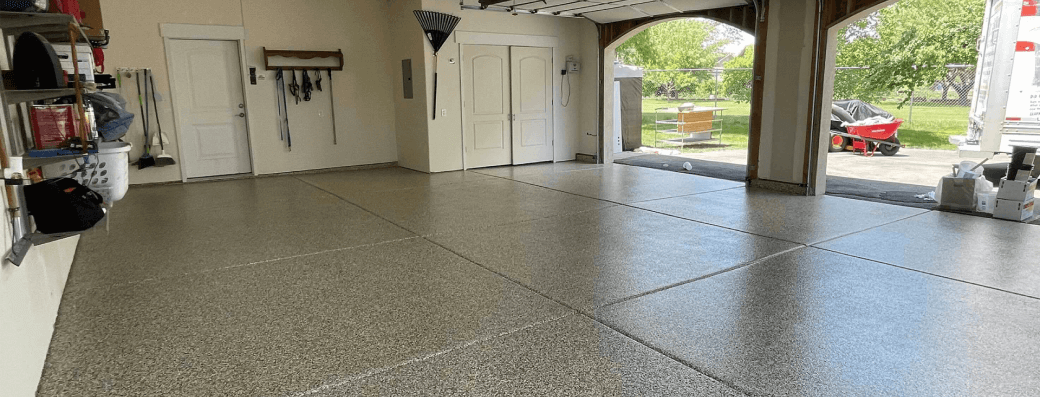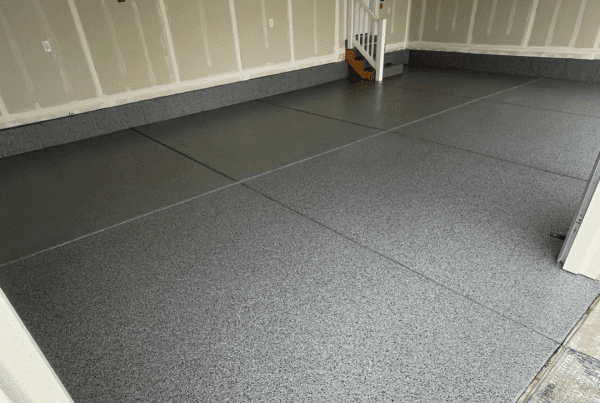Compare Prices on your Epoxy project
Get free epoxy service quotes in minutes and select the best deal!
Epoxy is a resin that is commonly used in concrete flooring coatings and is a popular flooring option for commercial and residential projects. Epoxy is an excellent material for sealing and protecting floors from moisture and chemicals. It is long-lasting and resistant to wear and tear, making it an ideal choice for high-traffic areas. It’s also durable, easy to clean, and slip-resistant.
Epoxy has excellent adhesion properties. It has a high bonding strength to concrete and other surfaces, which makes it a great choice for floors that need to be sealed or protected from moisture and chemicals.
These floors are also low-maintenance. You can easily clean epoxy flooring by sweeping or mopping to remove any small particles. Using a soft cloth to wipe liquids or stains immediately from the epoxy flooring can also be very helpful to keep the floor maintained.
Ultimately, using epoxy flooring will save you both time and money. You can even customize them to meet the specific needs of your space. They can be made stain-resistant or anti-static for example. Furthermore, epoxy flooring can give any room a one-of-a-kind look. It can have a polished texture, and property owners can select from a variety of styles and colors.
There are many different types of epoxy flooring on the market, so research is essential to find the best one that fits your needs. However, due to its inherent classy appearance, some property owners are wary about the potential epoxy floor cost. The good news is that, with the proper knowledge, installation, and professional assistance, epoxy flooring is a cost-effective option that can add value to your property.
Read on about the average cost of epoxy flooring, what you can expect, and everything you need to know during the installation process.
Is Epoxy Flooring Expensive?
Epoxy flooring costs for a standard 2 car garage, 500 sq-ft will have an estimated cost of around $2,750. The professional installation costs an average of $5.50 per square foot, which includes labor and material costs. Definitely note that epoxy flooring costs are commonly affected by several factors, including the square footage of the area, the condition of the concrete, repair work, and the type of epoxy used. The type of epoxy used can also affect the price.
There are two different types of epoxy coating: 100% solid epoxy and a water-based epoxy. Although 100% solid epoxy is more expensive than water-based epoxy, it is more durable and lasts longer.
- Solid Epoxy
Completely solid epoxy resins do not include any volatile solvents. It also produces a thick layer of up to 2 millimeters. Because of this, they are exceptionally stable and resistant to deterioration from heat or lightEpoxy resins are suited for a diverse range of applications due to their extremely high strength and durability over an extended period. They are commonly used in the construction and industrial sectors due to their toughness and consistency. This type of epoxy coating is three times more expensive than the water-based type but can last longer. - Water-based Epoxy
A water-based epoxy resin disperses in water. This type of epoxy flooring can have some advantages: it contains fewer volatile organic compounds, has little to no odor, and can be easier to clean. Water-based epoxies are also more abrasion and chemical-resistant, and are more usable in a wider temperature range than solid epoxy. In addition, it is less expensive than solid epoxy, partly because it has a thinner layer than solid epoxy flooring. It may be less durable, but water-based epoxy flooring is also easier to apply.
When deciding whether to coat concrete flooring with epoxy and which type of epoxy flooring to use for your home or construction project, it is critical to consider both the cost and the benefits. Overall, epoxy floor costs are always reasonable when viewed as a long-term investment that has a quick payoff.
Epoxy Coating Process: What To Expect
Now that you have an idea of the cost of concrete epoxy flooring, the next thing to learn about is the installation process. The process of applying an epoxy coating is not complicated. However, one must take specific steps to ensure the proper epoxy flooring installation.
- First, an epoxy coating will require a clean concrete surface. The professionals will ensure there are no cracks or holes in the concrete. They will then use a diamond grinder, which opens the pores and allows maximum adhesion. This will remove all of the waxes, oils, grease, and stains. After the grinding is finished, it’s best to vacuum and mop the floor.
- Secondly, once the surface is ready, they will apply the base coat on the first day. The base coat will have an 8-12 hour dry time. Once the base coat is dry, the crew will return the next day to inspect your floor and lightly sand any areas that need attention and apply the color coat.
- The final color coat will have an 8-12 hour drying time. The third day will consist of applying the clear epoxy top coat.
- Applying this clear top coat is the fourth and final stage. This gives the floor a textured finish and a layer of protection at the same time, and is what gives the surface a polished appearance.
It typically takes between three to four days to finish the installation due to the time epoxy takes to cure. During this time, there should not be any dirt or debris that would come into contact with the epoxy flooring. It also must not be stepped on. This could cause damage to the flooring finish and add to your epoxy floor costs due to repairs.
When the epoxy has had time to dry thoroughly, you finally have a surface that is durable and straightforward to clean. In most cases, its maintenance would only involve regular routine sweeping and mopping with a mild soap or dish soap. Dish soap works the best with warm water, which removes the dirt and dust from the floor. This makes it a cost-effective flooring choice for property owners.
If you are considering applying an epoxy coating to your concrete floor, it’s best to get expert advice. Professional contractors who can advise you on the type of epoxy products that will work best for your project, reduce epoxy floor costs, and guide you through the entire installation process.
After Care: How To Maintain Your Newly Installed Epoxy Floors
After having your epoxy floor installed, there are a few things that you can do to increase its longevity and guarantee that it will serve you well for a good number of years to come. The following is a list of suggestions for maintaining your new floor:
- Sweep the floors regularly— Maintaining a regular sweeping and dusting schedule will help keep the surface clean and fresh-looking.
- Avoid harsh chemicals— You should avoid using harsh chemicals or abrasive cleaners at all costs because doing so can damage the coating.
- Clean spills immediately— Spillages must be cleaned up as soon as possible using a soft cloth or a damp cloth. Corrosive liquids can discolor the floor.
- Cleaning Maintenance— Your floors can be mopped or foam squeegeed (not rubber) as needed. You may use a mild soap or dish soap. Dish soap works the best with warm water.
- Carefully move furniture— If you need to move large or heavy furniture, raise them rather than dragging them across the floor or other surfaces.
Epoxy Installation: Why Should You Hire Professionals?
Many believe they can save on epoxy floor costs by installing it themselves. However, this is usually not the case. When it comes to epoxy floor installation, there are numerous benefits to hiring professionals.
Contractor Experience
Professionals have the necessary experience and knowledge. They understand how to properly prepare the surface, mix the epoxy, and apply it to ensure a long-lasting and durable finish. DIYers frequently make mistakes in one or more of these areas, which later can result in costly repairs.
Faster Installation Process
Professionals have the necessary tools and can complete the job quickly and efficiently. In the long run, this can save you time and eventual trouble.
Customer Satisfaction and Warranty
A warranty usually accompanies the professional installation, which means you’ll be covered if there are any issues with the epoxy flooring in the future. DIY installations typically do not have a warranty, so you will be on your own if something goes wrong.
Connecting You with Topnotch Epoxy Contractors You Can Trust
“Seasoned contractors at HelloProject have years of experience installing decorative & durable floors in different home remodeling projects.”
If you are considering installing this type of flooring in your home or business, consult a professional to ensure a high-quality job. Contact HelloProject today!
Compare Prices on your Epoxy project
Get free epoxy service quotes in minutes and select the best deal!



